February 2019
Sh’vat/Adar I 5779
Call 206-567-9414 for event details or see our online calendar here.
February
- 3 Coordinating Committee Meeting
- 20 Kugelettes
- 22 Shabbat Potluck
- 25 Super Supper
March
- 2 Havdalah, Movie & Discussion
- 3 Coordinating Committee Meeting
- 24 IFC Concert
- 25 Super Supper
COMMUNITY
Thanks from Steve Soltar & Family
You, my fellow members of Shir Hayam, have given me a spiritual home for nearly forty years. Throughout this time, your voices, presence and thoughts have always been there to nurture me and help me understand and appreciate the meaning of community. When I suffered a heart attack in December, I know the shock affected, not just me and my family, but many of you as well.
I want you all to know how deeply touched and appreciative I have been by your thoughts, prayers, visits, meals, pillows, cards, harmonica, shower benches, hugs, concern and more. Nina, Johanna, Mikaela and my sister, Leah join me in thanking you for your love and support.
I am happy to share that I am on the mend, rebuilding my strength and stamina and even venturing out into society bit by bit. I know how truly blessed I am to still be here with you. For that I am grateful. My heart draws strength from each of you and from our Chavurah community.

February SHABBAT Potluck
March HAVDALAH Potluck
“Driving Miss Daisy,” “The Temple Bombing” and the rabbi from Squirrel Hill: perspectives on assimilation, racism and anti-Semitism from civil rights era Atlanta.
Tu B’Shevat – TREE OF HOPE
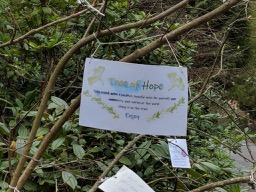
On Tu B’Shevat, we wrote our hopes on tags that we decorated and hung them on a tree at the end of our driveway. There is a sign and a bag of cards and tags for people walking by to add their own hopes. ~Robin Hruska & Mike Orr
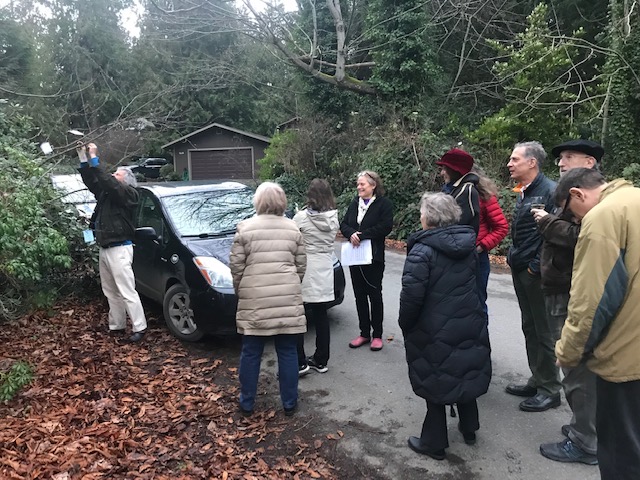
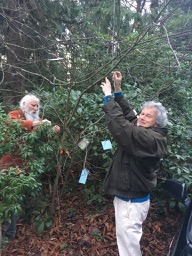
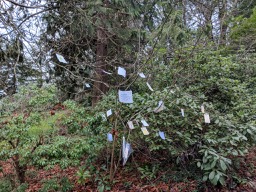
CULTURAL EVENTS COMMITTEE
We enjoyed an afternoon of American Songbook tunes played by Bill Rappaport (clarinet), Yvonne McAllister (97 year old trumpeter extraordinaire), and Dale Brown (violin & banjo).
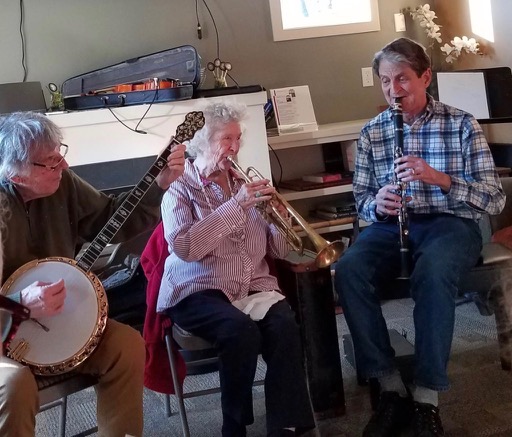
The concert was preceded by a quick east coast swing dance lesson by Terry Cowan and Mark Cohen. We all gave it a try with varying degrees of success and lots of laughs.
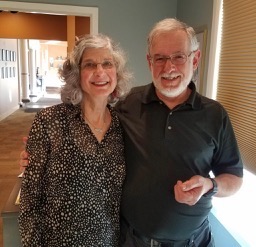
Many enjoyed the annotated list of songs put together by Carol Rappaport – so we’re sharing them here:
When Sharon asked if my husband Bill could play music for the Chavurah I said I’d ask but that he mostly did not play specifically Jewish music. However, in researching these tunes I have found that there are Jewish connections to nearly all of them.
The most interesting to me is the connection between Louis Armstrong and the Karnovskys, a family of Lithuanian Jewish immigrants in New Orleans. Louis Armstrong detailed their relationship in “Louis Armstrong + the Jewish Family 1907”. The family hired Louis, then a boy of 7, to help them with their businesses in New Orleans : junk collecting and reselling, and selling coal to the ladies in the red light district. At some point he started blowing a toy horn to alert customers that the Karnofsky wagon had arrived. Louis later took the mouthpiece off the horn and was able to play a tune by changing how he held his lips. Recognizing his musical talent, the Karnovsky’s forwarded Louis $2 of his salary towards the purchase of a $5 cornet they saw in the window of a pawn shop. Louis saved 50 cents a week until he could pay for the trumpet. The Karnofskys encouraged “singing from the heart”. He later performed and recorded many of the tunes which will be played today.
Another interesting connection I found involved Henry Mancini, composer, with Johnny Mercer, of “Days of Wine and Roses” He was drafted into the army in 1943 after one year at Julliard. In 1945, he participated in the liberation of Muthausen-Gusen concentration camp in Austria.
The Tunes, in alphabetical order:
“After You’ve Gone”1918 Turner Layton/ Henry Creamer – Recorded by many including Bessie Smith, Duke Ellington, Al Jolson, Benny Goodman, Frank Sinatra, Louis Armstrong, Django Reinhart
“Bei Mir Bist Du Schoen” (To Me You Are Beautiful) 1932 Sholom Secunda/Jacob Jacobs – Originally written for the Yiddish Operetta “I Would If I Could”, the song was sold to a publisher for $30. New English lyrics were written by Sammy Cahn and the Andrews Sisters 1938 recording was very successful. It became poplular in Russia and Germany, was recorded by many including Bette Midler, Ella Fitzgerald and Judy Garland. It is estimated to have grossed 3 million for the publisher holding the copyright over 28 years.
“Days of Wine and Roses” 1961 ? Henry Mancini/Johnny Mercer – Writers received an Academy Award for Best Original Song from the 1962 movie with the same name. best known recordings- Billy Eckstine, Andy Williams
“I Don’t Know Enough About You” 1946 David Barbour/Peggy Lee – Peggy Lee was a singer in Benny Goodman’s band. When David Barbour joined the band and “fraternized” with the girl singer, against Benny’s rules, he was fired. Though he did get to marry Peggy.
“I’m Making Believe”-1944 James Monaco/Mack Gordon – Benny Goodman and his orchestra were nominated for an academy award for their performance of this song in the film “Sweet and Low Down
“I’ll Take Care of Your Cares” Mort Dixon/James Monaco – Recorded by Frankie Laine 1967, The Mills Brothers
“My Ideal” 1930 Richard Whiting/Newell Chase/ Leo Rubin – First recorded by Maurice Chevalier
“Nevertheless” 1931 Harry Ruby/Bert Kalmar – Recorded by many including Jack Benny, The Andrews Sisters, Frank Sinatra, The Mills Brothers, Liza Minellini and Bob Dylan
“Once In A While”1937 Michael Edward/Bud Green – Recorded by Tommy Dorsey, Pattie Page, Louis Armstrong and Frank Zappa among others.
“September In The Rain” 1937 Harry Warren/Al Dubin – Performed by James Melton in the film “Melody for Two” Recorded by many including Frank Sinatra, The Beatles, Willie Nelson, Doris Day, Yehuda Menuhin. Peggy Lee’s recording was included in the film “Gorillas in The Mist”
“Stars Fell on Alabama” 1934 Frank Perkins/Mitchell – The name of the song is thought to have been borrowed from Carl Carmer’s autobiographical book of the same name and is a reference to an incredible Leonid Meteor Shower in 1833. Recorded by many including Ella Fitzgerald and Louis Armstrong, Guy Lombardo, Billy Holliday, and Jimmy Buffet.
“Talk of the Town” 1933 Jerry Livingston/Marty Symes/AJ Neiberg – Recorded by many including Charlie Parker, Dave Brubeck, and Benny Goodman
“The Gypsy” 1945 Bill Reid – Recorded by Dinah Shore ( daughter of ) Russian Jewish immigrant shopkeepers
“Til Then” 1944 Eddie Seiler/Sol Marcus/Guy – A plea from a soldier to his sweetheart to wait for him
“Under A Blanket of Blue” 1933 Jerry Livingston/Al J. Neiburg/ Marty Symes – Recorded by many including Ella Fitzgerald& Louis Armstrong
“What’ll I Do” 1923 Irving Berlin – Recorded by Nat King Cole among others. Used in the score of the 1974 film “The Great Gatsby” and in episodes of the sitcoms “Cheers”, “Mad Men” and “The Golden Girls”
“Who’s Sorry Now?” 1923 Ted Snyder/Bert Kalmar/Harry Ruby – Featured in The Marx Brothers film “A Night in Casablanca”. A major hit for Connie Francis in 1958